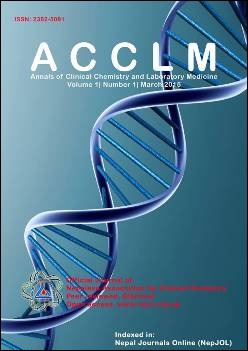Lipid profile in patients with alcohol dependence syndrome
DOI:
https://doi.org/10.3126/acclm.v1i1.12312Keywords:
ADS (Alcohol dependence syndrome), CHD (Coronary heart disease), HDL-C (high density lipoprotein cholesterol), TG (Triglyceride), LDL-C (Low density lipoprotein cholesterol)Abstract
BACKGROUND: Alcohol dependence syndrome (ADS) has become a global public health challenge because of its high prevalence and the concomitant increase in risk of liver disease, cardiovascular disease and premature death. Influence of alcohol use on lipid metabolism is well recognized. Investigations had been carried out in the earlier period on abnormal lipid profile as a risk factor for Coronary Heart disease (CHD). Patients of alcohol dependence usually have a consumption pattern of more heavy use. Therefore it is useful to study the lipid profile in patients of alcohol dependence, to understand the effects of increasing levels of consumption.
METHODS: This cross-sectional study was conducted in TU Teaching Hospital. ADS patients were screened by the consultant psychiatrist using the Alcohol Use Disorder Identification Test (AUDIT) questionnaire. A total of 89 patients scored positive on the AUDIT as having alcohol-related problems and were included in the study. 89 ADS patients and 89 healthy controls both male and female were enrolled as participants. Blood Pressure and other anthropometric parameters were measured while fasting blood samples were analyzed for serum lipid profile. SPSS program was used to analyze data, t-test & Spearman's correlation coefficient was used to find correlation.
RESULTS: Among the ADS cases 95% were current smokers. Mean age of cases and controls was 35.42±5.6 & 34.53±3.5 years respectively. The mean total cholesterol levels were found to be higher in cases (5.41±0.70) than controls (3.79±0.74) with a strong statistical significance (p<0.001). Also, Mean triglyceride (TG) levels (2.09±0.72), along with the mean HDL-cholesterol (1.66±0.40) and LDL-cholesterol levels (2.79±0.81) were also elevated in cases when compared to the control samples (p<0.001).
CONCLUSION: This study has demonstrated definitive lipid profile changes in patients of alcohol dependence, with some correlation to the liver dysfunction. Alcohol causes alteration in various parameters of lipid metabolism including those which predispose to CHD. Low to moderate alcohol use over prolonged periods has been linked to have protective influence for development of coronary heart disease (CHD), through increase in high density lipoprotein cholesterol (HDL-C) levels.
DOI: http://dx.doi.org/10.3126/acclm.v1i1.12312
Ann. Clin. Chem. & Lab. Med. 1(1) 2015: 29-32
Downloads
Downloads
Published
How to Cite
Issue
Section
License
Authors who publish with this journal agree to the following terms:
- The author transfers copyright to the Nepalese Association for Clinical Chemistry.
- The journal publishes the work under a Creative Commons Attribution License that allows others to share the work with an acknowledgement of the work's authorship and initial publication in this journal and under the same share-alike license used here.
- Authors are able to enter into separate, additional contractual arrangements for the non-exclusive distribution of the journal's published version of the work (e.g., post it to an institutional repository or publish it in a book), with an acknowledgement of its initial publication in this journal.
- Authors are permitted and encouraged to post their work online (e.g., in institutional repositories or on their website) prior to and during the submission process, as it can lead to productive exchanges, as well as earlier and greater citation of published work (See The Effect of Open Access).




